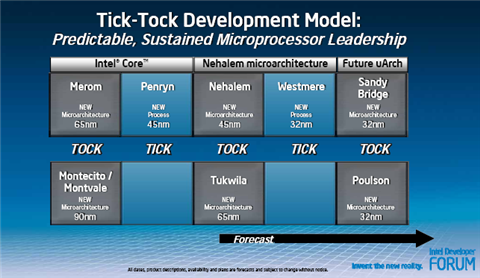Intel's roadmap comes into focus: Can rivals respond?

Intel's developer forum in San Francisco has more than its share of chest thumping and as the roadmap comes into focus you really wonder how competitors will respond.
To be sure, Intel won't have a cakewalk, but it's making a lot of waves, creating new markets (Netbooks powered by Atom) and ramping up computing power that rivals like AMD will find hard to match.
Intel's roadmap simply looks better (Techmeme):
So far at IDF, we've learned the following:
Next month Intel will ship its six-core Dunnington server processor, the last of the chip giant’s Penryn family of processors. According to Wachovia analyst David Wong Dunnington will offer a big performance improvement over Intel's 2-chip, quad core Tigerton chip. "We think this should allow Intel to pull significantly ahead of AMD's Barcelona chip on most applications, especially integer based applications, and equal or perhaps exceed Barcelona's performance on floating point benchmarks," said Wong in a research note.
Brooke Crothers at News.com reports that Intel will launch a power-efficient Atom processor for desktops. Intel executives have been bullish on Atom's prospects and have said that demand has been strong with little cannibalization of existing chips.
Details of Nehalem are emerging. The biggest news was Nehalem's turbo mode, which can turn cores on and off depending on the workload. John Morris notes:
To make turbo mode work, Intel said it designed “new transistors and silicon technology” so that a power gate at each core can shut down power completely, and added a Power Control Unit–a separate microcontroller with more than 1 million transistors of its own–to control the gates. In a not-so-subtle knock at competitor AMD and its “asset-smart” plans, Rajesh Kumar, an Intel fellow, said the new power management features showed why close cooperation between process technology engineers and chip designers was so important in advanced microprocessors.
Nehalem, Atom and Larrabee, Intel's integrated graphic chip aimed at Nvidia and AMD's ATI, all have multithreading prompting Wong to note that the chip giant "appears to have renewed enthusiasm" for the technology. But all that multithreading does nothing without programming tools--and the apps that go with them. Intel and Microsoft said Wednesday that they will launch parallel processing tools.
And Intel is launching a wide range of solid state drives with various form factors.
The big question is how rivals will respond to Intel's plans. Here's a look at rivals amid Intel's wake:
- AMD: Intel's primary rival has its Barcelona chips in order. However, Intel is planning to out-core AMD and win on performance. Meanwhile, AMD's favored argument--power efficiency--is increasingly being addressed by Intel too. Intel is promising a sports car with Prius mileage. If it delivers AMD will have a tough time matching. More worrisome is Intel's Atom-chips and the creation of the mobile Internet device market. AMD doesn't have any answer for the Atom and has chosen to hang back and let the market form. If Atom-based devices do take off, AMD will be lapped in the early going.
- Nvidia: Intel's Larrabee is more in the concept stage at this point with a lot of developer enthusiasm, but few details. But given Nvidia's recent problems with AMD's ATI is there really any question that Intel will also be a big threat?
- Samsung: Intel's splash into the solid state drive market will make life difficult for other players in the market, notably Samsung, Micron Technology and others. Intel doesn't necessarily have to win in this market--it just has to make margins tough for competitors.
Add it up and it's safe to say that Intel is on the move--even if you discount the fact that IDF is a developer cheerleading session in many ways.
